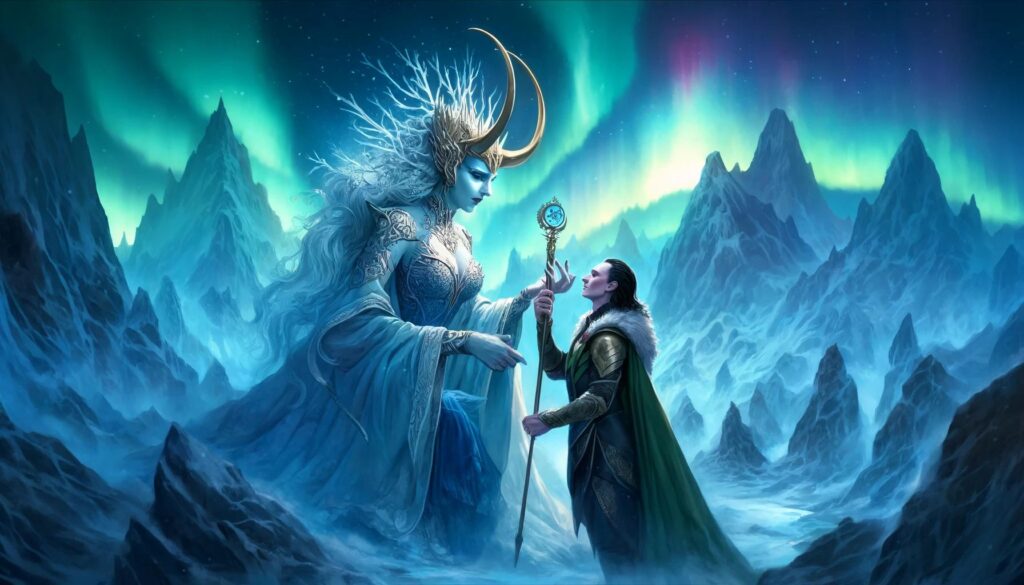Aesir Goddesses, Creatures in Norse mythology, Giants (Jötunn), Loki, Norse Goddesses, Norse Mythology
Laufey: The Enigmatic Mother of Loki in Norse Mythology
In Norse mythology, Laufey is an enigmatic figure often overlooked in popular culture. She is primarily known as the mother of the infamous trickster god Loki. Despite her limited appearances in the myths, Laufey holds significance in the Norse pantheon and has ties to the giants, a prominent group in Norse mythology, underscoring her role as a giantess.
Who is Laufey in Norse Mythology?
The Origins and Background of Laufey
Laufey, an enigmatic figure in Norse mythology, is primarily known as the mother of the infamous trickster god Loki, illustrating her indirect but crucial impact on the narratives involving gods like Odin. While her origins and background are shrouded in mystery, we have limited information about her parents or her specific place in the Norse pantheon. Nonetheless, Laufey’s connections to the giants, a prominent group in Norse mythology, suggest a significant role within the mythological framework.
Laufey’s Role in the Norse Pantheon
Although the details surrounding Laufey’s involvement in Norse mythology are scant, she is mentioned in a few ancient texts, most notably the Prose Edda. This text provides some insights into her role and significance in the pantheon. Laufey’s presence implies a deeper understanding of the complex relationships among the gods, giants, and other mythical beings.
The Significance of Laufey in Old Norse Texts
In Old Norse texts, Laufey’s character holds symbolic meaning and contributes to the overall mythological narrative. Her presence establishes a familial tie between her and Loki and hints at her potential influence on his character and actions. As such, Laufey’s significance in these texts offers a deeper understanding of the intricate dynamics within Norse mythology.
What is the Relationship Between Laufey and Loki?
Laufey’s relationship with Loki is intriguing and complex. As his mother, she plays a significant role in shaping his identity and attributes, defining Loki as the god of mischief. The matronymic connection, where their mother’s name identifies someone, is particularly relevant in the case of Loki, as he is commonly referred to as Loki Laufeyjarson. This naming convention emphasizes Laufey’s importance in his life and underscores her influence on his character.

Exploring the Matronymic Connection: Loki Laufeyjarson
In Norse mythology, the naming convention for children often included their father’s name followed by “son” or “dóttir” to indicate their lineage. However, Loki’s unique designation as “Loki Laufeyjarson” reflects the significance of his connection to Laufey. By using her name as part of his title, Loki’s matronymic connection highlights the bond between mother and son, further emphasizing Laufey’s role in his story.
Laufey’s Influence on Loki’s Mischief and Chaos
Laufey’s influence on Loki’s mischievous nature and chaotic behavior is a topic often explored in mythological interpretations. As his mother, she contributes to his rebellious and unpredictable personality, shaping him into the trickster god that he becomes. Laufey’s presence in Loki’s life provides both the inspiration and foundation for his infamous pranks and schemes, solidifying the intricate relationship between mother and son.
The Mythological Bond between Laufey and Loki
Beyond their familial connection, Laufey and Loki share a mythological bond that goes beyond their individual roles. Together, they represent the complex interplay between order and chaos, tradition and rebellion, within Norse mythology. Laufey’s presence as Loki’s mother strengthens the narrative tension and adds depth to the mythology, making their relationship a subject of fascination for scholars, enthusiasts, and even popular culture interpretations like Marvel Comics.
Why is Laufey Considered a Significant Goddess in Norse Mythology?
Although Laufey, mother of Loki, is not traditionally recognized as a goddess in Norse mythology, her associations with mischief, chaos, and, most notably, her connection to Loki’s character grant her a significant role in the pantheon. While her specific position within the Aesir pantheon, the main group of Norse deities is open to interpretation and varies across different myths and stories, Laufey’s symbolic representation as the goddess of mischief and chaos is undeniable.
The Symbolism of Laufey as the Goddess of Mischief and Chaos
The significance of Laufey lies in her embodiment of mischief and chaos, qualities often attributed to the trickster god Loki. As Loki’s mother, Laufey’s association with these characteristics adds depth to her mythological role. The interplay between Laufey, or Nál as an Old Norse name suggests, and Loki highlights the unpredictable and disruptive forces present in the Norse pantheon.

Laufey’s Role in the Aesir Pantheon
While Laufey’s exact position among the Aesir deities may be subject to interpretation, her presence in Norse mythology signifies her importance among these divine beings. As a mother figure to Loki, Laufey’s influence extends beyond her individual role and contributes to the overarching dynamics within the pantheon, interacting with figures like Odin and other Norse gods. Her connection to Loki, a central figure in Norse mythology and the god of mischief, ensures her place in the divine hierarchy.
Interpreting Laufey’s Position in Old Norse Mythology
Interpretations of Laufey’s position in Old Norse mythology may vary due to limited textual references. However, examining her associations, symbolism, and relationships provides valuable insights into her significance. While she may not possess the traditional attributes of a goddess, Laufey’s role as a powerful maternal figure and her ties to the trickster god Loki solidify her importance in Norse mythological narratives.
What Legends and Texts Provide Insights into Laufey’s Character?
The character of Laufey in Norse mythology is revealed through various legends and texts, offering glimpses into her intriguing persona, often depicted as a frost giant or giantess. One significant source of information is the Prose Edda, a collection of ancient Norse myths and legends compiled by the Icelandic scholar Snorri Sturluson in the 13th century, which offers insights into the complex relationship between Laufey and key figures such as Odin.
Prose Edda References to Laufey and Loki
The Prose Edda contains references to Laufey and her relationship with Loki, her notorious son. These texts shed some light on their connection, showcasing the complexity and depth of their bond. While the information is limited, it provides valuable insights into Laufey’s role as a mother and the dynamics between her and Loki.
The Matronymic Tradition Associated with Laufey
In Norse culture, there is a significant emphasis on matronymic tradition, where individuals are identified through their mother’s name. This matronymic connection often highlights Laufey’s association with Loki, reflecting a Norse culture that values the name Laufey and matronymic traditions. Exploring this tradition allows us to delve deeper into the significance of Laufey and her role in shaping Loki’s identity.
Exploring Laufey’s Presence in Various Norse Myths
Besides the Prose Edda, Laufey’s presence can be found in various Norse myths and legends. These stories provide additional context and give us glimpses into her character as a slender figure, and interactions with other deities in the Norse pantheon. By examining her involvement in these myths, we gain a more comprehensive understanding of Laufey’s role and place in Norse mythology, particularly concerning Odin and the broader context of Norse gods.
Summary
In summary, Laufey is an enigmatic figure in Norse mythology, primarily known as the mother of Loki. Despite the mysterious nature of her origins and background, Laufey holds significance in the Norse pantheon and plays a crucial role in shaping Loki’s character.
As a symbol of mischief and chaos, Laufey’s presence adds depth to the rich tapestry of Norse mythology. Her matronymic connection to Loki, as reflected in his name, “Loki Laufeyjarson,” further underscores their intimate relationship and highlights the importance of maternal lineage in Norse culture.
While she is not traditionally considered a goddess, Laufey’s association with mischief and chaos aligns her with the gods and grants her a noteworthy position within the Aesir pantheon, akin to her son, the god of mischief. Throughout various legends and texts, such as the Prose Edda, Laufey’s character emerges, offering glimpses into her role and influence in different Norse myths.

